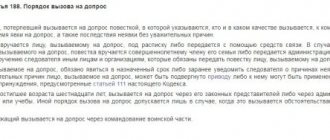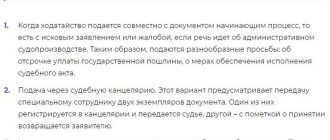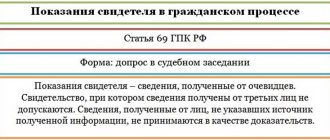In court hearings in criminal or civil cases, the interrogation of a witness is the most important evidence that directly affects the substance of the court decision. The interrogation procedure in court must fully comply with procedural requirements, otherwise witness testimony may be excluded from admissible evidence. Previously, we have already drawn the reader’s attention to the features of interrogation by an investigator at the stage of preliminary investigation (read here). In this article we will talk about the features of questioning witnesses in court.
How to call a witness to court in a criminal case
Usually, participants in a criminal case do not need to take measures to ensure that witnesses appear in court. At the end of the indictment for each case there is a list of persons who must be summoned to court, it looks like this:
| LIST of persons to be summoned to the court hearing: 1. Accused: R.O Parusov, registered at the address: Tyumen, st. Krasnaya, 3; Currently, he has been chosen as a preventive measure in the form of detention and is being held in pre-trial detention center-2 2.Defender: lawyer of the Tyumen branch of the Bar Association K.U. Mironov. 3. Victim: Lukina S.L., registered and lives at the address: Tyumen, st. Polomenskogo, 18, apt. 10 Prosecution witnesses: 4. Boldyrev K.D., registered and resides at the address: Tyumen, st. Pisareva, 10 5. Rybakov A.P., registered and resides at the address: Tyumen, st. Dybenko, 12, apt. 6 Defense witnesses: 6. Permyakov S.S., registered and resides at the address: Tyumen, st. Tarasova, 239, apt. 1 Investigation Department Investigator crimes against property P.R. Malkov |
As can be seen from the above list, it contains both prosecution witnesses and defense witnesses (the latter are usually fewer in number). The responsibility to ensure attendance at the hearing lies with the court staff, whose employees send out subpoenas. At the same time, both the victim and the defense have the right to call additional witnesses, they may be:
- persons who were interrogated by the investigator, but he did not consider it necessary to include them in the list;
- persons whose interrogation was refused during the investigation - the parties have the right to declare them again, already at the stage of the court hearing;
- those people whom no one knew about before the trial (for example, a lawyer conducted his own investigation and identified an eyewitness).
Thus, there is no need to file a separate reasoned petition for the interrogation of those included in the list of indictments or indictments.
If a party has come to the conclusion that it is necessary to interrogate other people, a request for this can be made either orally or in writing. Regardless of the form of the application, calling an additional witness must be motivated by:
To the Leninsky District Court of Tyumen, Judge G.P. Stryukina. Lukina S.L., the victim in the case against Parusov R.O., accused of committing a crime under paragraph “a” of Part 3 of Art. 158 of the Criminal Code of the Russian Federation (theft with illegal entry into a home)
Petition (SAMPLE) for questioning a witness in court
Your Honor! I ask you to summon and interrogate as a witness for the prosecution citizen E.S. Polyakova, living at the address: Tyumen, st. Moskovskaya, 34. Polyakova E.S. is a postman, she brought me a pension in the amount of 8,000 rubles on the eve of the theft. Taking into account the position of Parusov R.O. that he did not steal money, I consider this person an important witness who can confirm the presence of money in my apartment at the time of the theft.
Based on the above, guided by clause 5, part 2, art. 42 Code of Criminal Procedure of the Russian Federation,
ASK:
Summon and interrogate E.S. Polyakova at the court hearing. Send her a summons to the address I indicated.
Lukina S.L., date, signature
Before filing such a petition, we recommend that the court consider the following:
- it is usually submitted after the interrogation of all persons who were named in the list attached to the indictment. At the same time, if it is more expedient to bring a witness earlier than “scheduled,” the law allows this;
- we do not recommend making copies of the petition for other participants (there is no need for the opposite party to provide access to the personal data of the summoned person), especially since the Code of Criminal Procedure of the Russian Federation does not contain a corresponding requirement for this;
- Once again, make sure that the data specified in the application is correct: full name, residential address, you can also indicate a telephone number for direct contact with a potential witness;
- if you need to summon a minor for questioning, this must be done through his legal representative, that is, parents, guardians (for more information about questioning minors, read our article);
- If you can ensure the attendance of a witness yourself, you are allowed to bring him with you to the court hearing. In accordance with criminal procedure legislation, the court does not have the right to refuse to interrogate persons who have already appeared at the start of the proceedings. Thus, you will take all measures to ensure that your application is unconditionally granted. In this case, you can do without writing and submit your petition orally.
Question: What to do if the court refuses to question a witness?
Answer : Act according to the circumstances: you can present other evidence (documents, video recordings, testimonies of other persons), and then once again submit a similar request to interrogate the same person. At the same time, draw the court’s attention to the fact that the evidence presented must be supported by the testimony of the person whose appearance you insist on. If the evidence is exhausted and you can no longer present anything to the court, all that remains is to appeal the refusal to satisfy the petition in an appeal against the verdict (the Code of Criminal Procedure of the Russian Federation does not provide for a separate appeal procedure). The complaint can also raise the issue of summoning persons - if the appellate court considers the petition to be motivated, an interrogation can be conducted when reviewing the decision.
We remind the reader that in criminal cases considered under the rules of special proceedings, witnesses are not called or questioned (read more about the special procedure for considering criminal cases here).
You received a summons or an investigator called you
There are two main ways to call a witness for questioning:
- You, your relatives or your boss will be served with a summons at work. Such documents are rarely sent by mail;
- The investigator will call you and invite you for questioning.
As practice shows, the investigator usually uses both methods to eliminate the possibility that the witness will ignore the subpoena and decide not to appear for questioning.
Moreover, both your local police officer and a regular postman can serve the summons. And then they will call you and invite you for interrogation.
Let's look at both situations.
Agenda
In accordance with Article 188 of the Code of Criminal Procedure of the Russian Federation: a witness is summoned for questioning by subpoena.
The summons is handed to the witness against signature. If the witness is not found, then the summons is given to an adult member of his family or it is handed over to the administration at his place of work or to other persons and organizations that are obliged to hand over the summons to the witness.
Typically the agenda looks like this:
Each person has the right to decide independently what to do when receiving a summons. We recommend that you definitely appear for questioning without ignoring the summons.
If you still decide not to appear for questioning, what to do?
The classic way to call a witness for questioning is to notify by registered letter, since in this case the investigator will receive proof that the recipient was notified of the letter!
To achieve this goal, as a rule, a registered letter is sent with a notification.
If the recipient of the notification is not at home at the time of delivery of the summons, it is handed to an adult family member or work colleagues (also against signature).
In the event that the investigator decides to send a registered letter, the witness only receives a notice of the need to appear at the post office at the specified address and pick up the registered letter.
If the letter is returned to the investigator after 5-7 days, and the notification was given to you (you were simply thrown a Notification receipt in your mailbox), then it will be considered delivered to you, i.e. on paper you were warned about the call, even if you didn't know it. Therefore, you can no longer claim that you did not know about the summons for questioning.
In the photo you can see a sample notification.
So, if the subpoena was not delivered in person and you did not sign for it, then of course you can avoid appearing for questioning on the grounds that no one informed you. But this position, in our opinion, is controversial, since you will have to prove why you did not learn about the subpoena from your loved ones if you actually live at this address and did not go on a business trip or vacation. And if you left, then be so kind as to show your tickets, and so on and so forth.
If the summons was delivered to you in person and you signed for it, then you will have to appear for questioning.
What else can you do
Immediately after receiving the summons, you should pay attention to the basic information that must be mentioned:
- time of interrogation;
- date of interrogation;
- procedural actions;
- in what capacity are you called;
- who calls for questioning;
- investigator contacts.
For example, if the summons does not indicate in what capacity you have been summoned, the following text should be written on the summons or in a separate letter:
“Due to the fact that my procedural status, within the framework of which they plan to question/interrogate me, is not indicated, I cannot appear, since it is impossible to determine whether I will need qualified legal assistance. I ask you to inform me in writing about my procedural status.”
The letter should be sent with a notification; it can be sent by fax. This method will help delay the interrogation date for some time.
Phone call
The second method of notification is a telephone call. When it comes to a phone call, people ignorantly think that it can be ignored and not given any importance, but this is not so. In this case, evidence of receipt of the notification will be the telephone recording of the investigator and the witness. Therefore, in the case where you answered the phone call, you should appear for questioning on the specified date.
Politely inquire about the identity of the caller; if the person does not provide you with information, ask to be summoned. Don’t forget to find out all the necessary information (address, office, date, who you will be interrogated as, etc.), specify how long it will take. Try to show interest and, if possible, assist the investigative authorities.
The legality of the procedure is a rule not only for the investigator, but also for you. If it seems to you that the investigator is violating the legality of the procedure for calling for interrogation, then you can assume that violations will continue in the future. To prevent these violations, you must emphasize your desire to comply with the law and require the investigator to do the same.
If you have a lawyer, be sure to coordinate your visit to the investigator with him:
Lawyer Christina Shekina comments on the status of the witness on
When the witness failed to appear
In many cases, judges are faced with the failure of summoned persons to appear in court. Here are some examples:
- A summons was sent to the person, he received it, but does not want to appear. In this case, at the request of the parties, the court has the right to issue a decree on the delivery, which is transferred to a special department of the bailiff service that carries out forced delivery. The resolution specifies the date and time of the court hearing to which the witness must be brought.
- If a subpoena has been sent, but there is no information about its receipt and the bailiffs have established that another person lives at the address indicated in it, the court has the right to request information about the person from the City Address Bureau, and then send the subpoena to a new address. The court does not have the right to put a person on the wanted list or instruct the police to establish the whereabouts of a witness.
- When a person summoned to court is not hiding and wants to come according to the summons, but cannot do this due to physical conditions (for example, due to illness), the court may decide on a mobile court hearing.
- If a witness changed his place of residence during the investigation and at the time of the trial lives in another region, the court has the right to decide to conduct video conferencing - video conferencing. The procedure is that a person appears in court in the city of his place of residence at the appointed time. At the same time, the court panel is assembled in the city where the case is being considered, the participants can see the witness on the screen, they can hear him, they can ask him questions, etc. Thus, with the help of technology, the “effect of presence” of a person in the courtroom is achieved.
- In some cases, the witness may be “classified.” This means that his data (full name, place of residence, year of birth, etc.) is not disclosed to anyone and is available only to the judge. For security purposes, such a person is assigned a pseudonym at the investigation stage. Such persons are interrogated in court via audio link: in the courtroom, his testimony is heard over the audio system by all participants, but his voice is changed using electronic technology. During the interrogation, the witness is in a special room outside the court session; he also hears questions, explanations of rights and obligations, that is, the entire course of the proceedings.
- The person does not appear in court for unknown reasons: the summons is returned and not actually served, the bailiffs have not established any information about the location, the request to the Address Bureau was unsuccessful. In such cases, the Code of Criminal Procedure of the Russian Federation allows the court (even if one of the parties disagrees) to read out the testimony of a witness given during the investigation, subject to certain conditions:
- upon the death of a witness or a serious illness that prevents him from appearing in court (this means an illness of such severity that even an on-site court hearing is inappropriate and can harm a person’s health);
- if the person summoned to court is a citizen of another state and refuses to appear for questioning;
- the person’s failure to appear is due to a natural disaster or other emergency that makes it impossible to appear in court (for example, an earthquake, a major regional accident, etc.);
- if it was not possible to establish the whereabouts of the person (all measures were taken: requests were sent to the AB, summonses were sent to all known addresses, and bailiffs were instructed to ensure appearance in court).
If both parties to criminal proceedings agree to the disclosure of the testimony of a witness that he gave during the investigation, the court may decide on the disclosure, regardless of the presence of one of the above grounds.
Can they beat and insult during interrogation?
People often become afraid to go to interrogation for a number of different reasons.
There is no need to worry; no illegal actions will be carried out against you.
But psychological pressure from the investigator is possible.
The investigator may use psychological and tactical techniques and try to mislead you, not tell the whole truth and hide the current progress of the investigation.
Take the interrogation seriously, think about what and how you say.
Even if you are unfamiliar with the person involved in the criminal case, do not be irresponsible with your testimony. This can harm the innocent, including you.
Procedure for questioning a witness in court
The first to begin interrogation is the one on whose side the witness is. So, if a witness for the prosecution appears (you must be guided by the list of persons in the indictment - it indicates the status of each), the state prosecutor interrogates him first.
If there are several representatives of the party (for example, the defendant has several lawyers), the issue of priority among them is resolved by them independently. The interrogation of a person who is additionally summoned (that is, based on a petition) begins with the person who filed such a petition.
The procedure for questioning in court is as follows:
- The court announces the full name of the person who appeared for questioning, as well as “whose” this witness is: the prosecution or the defense.
- The citizen is removed from the courtroom before the start of his interrogation. He should not be present when other persons (accused, victims) testify, as well as when resolving procedural issues (extending the period of detention, resolving motions to exclude evidence, etc.). The witness is not allowed to talk with other participants in the meeting, including relatives, loved ones and other witnesses present.
- The judge invites the summons into the courtroom, finds out whether he has or does not have family ties with the defendant, the victim, and explains the right not to testify against himself and his relatives. The obligation to testify is brought to the attention of the public, responsibility under Art. 307, 308 of the Criminal Code of the Russian Federation for giving false testimony and refusal to testify, the witness signs the so-called “subscription”, thereby confirming that he understands these norms of the criminal law. A citizen is provided with a translator if he does not speak (or speaks little) Russian.
- Usually the interrogation begins with the questions: “What do you know about the case? What can you tell us about what happened? What have you seen regarding the crime that is being prosecuted?” This gives the witness the opportunity to freely state whatever he considers necessary.
- The party that invited the witness asks clarifying questions. It is unacceptable to ask leading questions (that is, those that suggest the “right” answer), as well as questions that are not relevant. The court, on its own initiative or at the request of a party, can “remove”, that is, cancel - the witness’s answer to them is not taken into account. Example No. 1 . During the interrogation of witness Syzranov E.N. the state prosecutor asked him a question: On February 20, 2018, did you see the defendant Karasev N.O., dressed in a red jacket, walking along the street. A villager with a Sony TV in his hands? The defense asked to withdraw this question, since it is leading: the question already contains information on the circumstances, how the defendant Karasev was dressed, what he was carrying in his hands, the brand of the TV, etc. The court agreed with the defense’s opinion and “removed” the question; the state prosecutor was asked to reformulate it.
- After the questions of the party that invited the person to court, the other party asks questions. The court has the right to interrogate at any time.
- If at the end of the interrogation procedure anyone has additional questions, they can be asked with the permission of the presiding officer. Here the order is no longer important.
During the court hearing, it is permissible to ask the witness about the documents that are present in the case. Then, with the permission of the judge, the witness may be shown specific evidence from the materials of the criminal case (for example, an invoice, an identification protocol, etc.), on which he will testify. In the protocol of the court session, this procedure is recorded in full, indicating the actions, for example: “the witness is invited to familiarize himself with the protocol for the seizure of shoes dated 03/01/2018 on sheets of case No. 123-126 in volume No. 2, after which he was asked the following question...”.
The witness has the right to use his own documents or records, but only with the permission of the court - for example, in criminal cases of an economic nature with many calculations and complex calculations. The parties have the right to request familiarization with such documents and their inclusion in the case materials.
At the end of the interrogation, the witness may exercise his right to reimbursement of expenses associated with appearing in court by submitting a written petition to the court:
To the Leninsky District Court of Tyumen, Judge G.P. Stryukina. Polyakova E.S., a witness in a criminal case against Parusov R.O., accused of committing a crime under paragraph “a” of Part 3 of Art. 158 CC
Petition for reimbursement of expenses associated with appearing in court for questioning
I ask you to issue an order to pay me the expenses incurred related to the need to appear in court to testify as a witness in a criminal case against Parusov R.O.
In connection with the summons (an agenda indicating the date and time of the meeting is attached), I had to return air tickets to Sochi (a family vacation was planned) and buy new ones for another date, while the airline withheld a commission of 5,400 rubles, and the new tickets turned out to be more expensive for 1200 rubles.
Thus, I incurred expenses totaling 6,600 rubles.
Based on the above, guided by clause 5, part 4, art. 56 of the Code of Criminal Procedure of the Russian Federation (the right of a witness to file petitions and bring complaints),
ASK:
Compensate me, Polyakova E.S., residing at the address: Tyumen, st. Moskovskaya, 34, expenses incurred in the amount of 6600 rubles, transfer to my account 000000222222, opened in branch 2323/00 of PJSC Sberbank of the Russian Federation, BIC0000000.
Enclosure: summons to appear on 03/01/2018, two air tickets, receipt of payment of the commission.
Polyakova E.S., number, signature
We're going for questioning with a lawyer.
We recommend that you come with a lawyer for questioning as a witness. There are three legal aspects that allow you to avoid some of the nuances at this point.
- During the interrogation, the lawyer has the right to give you the necessary legal advice. This is useful.
- Immediately after interrogation as a witness, the investigator can proceed to carry out other investigative actions, which can sometimes dramatically change your life in the future - during the interrogation, the “witness” can become a “suspect”. Therefore, timely legal assistance from a lawyer is important.
- During interrogation, the lawyer makes sure that your testimony is not distorted. Provides necessary evidence and prevents other psychological pressure during interrogation.
Repeated interrogation
Often the parties consider it necessary to declare the re-examination of a particular witness in court, for example:
- after questioning other persons, it became necessary to eliminate contradictions;
- the defendant gave evidence where he spoke about the events, but the witness questioned earlier kept silent about this in his testimony;
- Circumstances arose indicating a discrepancy between the testimony of the previously interrogated person and the established facts.
A request for another interrogation must be especially carefully motivated, because you need to convince the judge that a second procedure is necessary to consider the case. Sometimes a citizen who has already been interrogated earlier, with the permission of the presiding officer, remains in the hall, and questions arise to him while another person is testifying. The judge has the right to simultaneously clarify something with the person remaining in the room; this is called cross-examination.
Here is an example of a court hearing in one of the cases:
Presiding Judge: Witness E.N. Cherkasov, the interrogation is over, I suggest you take a seat in the courtroom, there may be additional questions for you. Secretary, invite witness K.E. Petrov.
Petrov K.E. (enters the hall): Hello.
Chairman: Come in, witness, introduce yourself.
Petrov K.E.: I am Petrov Konstantin Evgenievich, born on November 18, 1990, I live in Moscow, st. Perechnaya, 19.
Presiding Judge: I explain to you the rights and obligations (listed), as well as responsibility for giving false testimony and for refusing to give testimony. You do not have to testify against yourself or your close relatives. Tell me, witness, do you know the plaintiff or the defendant?
Petrov K.E.: No, these persons are not familiar to me.
Presiding: Do you know witness E.N. Cherkasov?
Petrov K.E.: No, I don’t know.
Presiding Judge: Witness E.N. Cherkasov, tell me, do you still insist that you knew K.E. Petrov?
Cherkasov E.N. (located in the hall): Yes, we studied with him in parallel groups at the institute.
Presiding Judge: Witness Petrov K.E., do you insist that you did not know each other?
Petrov K.E.: Sorry, I didn’t immediately remember the appearance of E.N. Cherkasov, indeed, I studied with him and know him.
Chairman: Tell us what you know about the case.
This is how, with the help of simultaneous interrogation of two persons, the court quickly eliminated the contradiction that arose as a result of the testimony. In this case, the method of “cross-examination” was used.
Do I need to take documents for questioning?
It often happens that a witness has documents related indirectly or directly to the event that occurred.
In this case, a logical question arises: Should these documents be taken for interrogation?
If you have documents related to the case, in accordance with Part 3 of Art. 189 you have the right to take them with you. But you should weigh the pros and cons before making such a decision.
Here you should consult a lawyer about the possible risks. His qualified assistance would be useful to clarify important details:
- Firstly, documents may be valuable for the investigation, and the investigator may decide to seize them in the interests of the investigation.
- Secondly, by such actions you can show excessive awareness of the details of what happened, which will entail increased attention to your person.
- Thirdly, when you come to an interrogation with documents, you reduce your time reserve for thinking through the investigator’s tricky questions, that is, he may ask about what is indicated in the documents and you will no longer have the option to remain silent.
False testimony
Despite the fact that each witness is warned about criminal liability for giving false testimony, there are often situations when a citizen reports information that is clearly inconsistent with the circumstances of the case. In such situations, it is possible to initiate a criminal case by sending a statement to law enforcement agencies, but only if there is reliable information about the intent of the interrogated person. After all, sometimes people are called to court months or even years after the events and may not remember everything (for example, as in our example, the witness simply forgot the appearance of the person he was asked about).
Due to forgetfulness, testimony may be given that differs from the pre-trial one. The indictment contains the testimony of all participants in the criminal case (this is a mandatory requirement of the criminal procedure law). During the in-person interrogation, both the lawyer and the state prosecutor monitor the content of the testimony that was given during the investigation and compare it with what was heard in court. If there are significant contradictions, each party has the right to file a motion to have the previous testimony read out. The court, making sure that there are contradictions, almost always agrees with the petition. In the presence of the witness, the interrogation protocol is read out, and clarifying questions are asked. If the contradictions are eliminated, to initiate a criminal case under Art. 307 of the Criminal Code of the Russian Federation is out of the question.
At the same time, when a witness deliberately changed his testimony and openly lies, he faces a fine of up to 80,000 rubles , as well as compulsory or correctional labor. Those who provided false information to the court and this resulted in another person being held accountable for committing a grave or especially grave crime may be punished by imprisonment for up to 5 years .
We remind you that from liability under Art. 307 of the Criminal Code of the Russian Federation, release is possible if a person confesses to lying before the verdict in the case is pronounced.
Learn more about liability for perjury.
What if I lie or make a mistake during interrogation?
Often a question arises in the mind of a summoned witness or suspect: “What will happen if I tell a lie during interrogation, forget or confuse circumstances important to the case?”
The main thing is to take a responsible approach to what you tell the investigator.
Say that you are not sure about the details if this is the case. If you have forgotten the information, then there is no need to invent something new in the investigator’s office. Do not pass off gossip and other people's fantasies and speculations as truthful information on the case. Answer directly only those questions to which you are sure of the truthfulness of the answers.
Even if you are unfamiliar with the person involved in the criminal case, do not be irresponsible with your testimony. This can harm the innocent, including you.
And do not forget that giving deliberately false testimony is punishable by law.
However, liability is not provided for accidental errors and misconceptions in the testimony. Therefore, it is better when a lawyer is present at the interrogation, who is able to correctly formulate answers to the questions asked by the investigator, and to think in advance about the tactics of answering the expected questions.
There is no liability for accidental errors and misconceptions in testimony.
You have been called: how to behave
Let's say you are a witness in a criminal case. Here are some practical tips on how to behave during interrogation in court:
- First, don't ignore the challenge. It will not be very pleasant when there is a knock on your door at 7 am - bailiffs try to bypass the addresses indicated in the arrest order as early as possible. It is your civic duty to appear and testify.
- It happens that the proceedings are postponed without starting (for example, representatives of one of the parties fall ill). Then you need to find out from the assistant judge the date of the next court hearing and receive a summons.
- Usually the person being called knows in advance under what circumstances they want to interrogate him. Try to remember well the events related to the crime in order to answer the questions posed as accurately as possible. There is no need to invent or assume if you do not remember this or that detail. It’s better to answer honestly: “I don’t remember.”
- Give your testimony confidently and clearly, provide only information that is relevant to the case. Do not focus on biographical information that is not related to the events of the crime.
- Remember that the witness does not have the right to ask questions to the participants in the process and the court. At the same time, he has the right to submit requests of various nature related to the procedural order (for example, a request for a break due to poor health, a statement about pressure exerted on him by other persons, a request for payment of expenses, etc. ).
How not to go to interrogation after receiving a subpoena
First of all, the investigator’s legal demands for a summons for questioning cannot be ignored. If you fail to show up, you may at least be fined.
The investigator may also forcibly bring you in for questioning as a witness.
If you still do not plan to appear for interrogation, then the only valid reason in this situation is illness. You will have to provide the investigator with a so-called certificate of incapacity for work, which will confirm that you were ill and could not appear on time for questioning.
You can not go to interrogation only if you have a certificate of incapacity for work.
Other reasons for not appearing for questioning as a witness are disrespectful and, accordingly, from the investigator’s point of view, are illegal. Therefore, a summons for questioning as a witness cannot be ignored.
Questioning a witness in court in a civil case
The interrogation procedure in civil cases largely coincides with criminal proceedings, but there are still some differences:
- Only those persons declared by the parties are summoned to the court hearing to resolve disputes: there is no list that is drawn up before the court hearing and is mandatory for the judge.
- In civil proceedings, there is no obligation for the judge to question a witness who has appeared. If the court considers the request for questioning to be unmotivated, it may refuse to satisfy it, even if an eyewitness to the controversial events is already outside the courtroom.
- In civil cases, written testimony of witnesses cannot be accepted as evidence, unlike in criminal proceedings, where interrogation protocols given at the pre-trial stage are widely used. At the same time, in some cases, the court, when considering a civil case, can do without repeated interrogation and read out the testimony of the person given earlier in the same court hearing. Example No. 2 . When considering a claim for debt collection, an employee of the Management Company was called, who brought to the attention of the participants a detailed calculation of the debt for housing and communal services. The case was postponed due to the busyness of the defendant's representative. The CC officer was unable to appear at the next court hearing. Since the parties did not have any new questions for him, it was decided to read out the testimony he gave at the previous meeting.
- In civil proceedings, a form of interrogation by writ is permissible - the procedure will be carried out by the judge of the city where the person lives, after which the original protocol will be sent to the court where the case is being considered on the merits. In criminal proceedings, this form of providing evidence is not provided.
- In civil proceedings, interrogation of “classified” witnesses is not practiced; video conferencing is extremely rarely used. In addition, a decree on summons is rarely issued: in the consideration of disputes, the principle of adversarialism is more pronounced than in criminal proceedings; Ensuring attendance is almost entirely the responsibility of the parties, and the court's participation in the delivery of witnesses is minimal.
Is it possible to come to the interrogation with a friend or lawyer acquaintance?
Sometimes you want to come to this event with people who can support you.
But you won’t be able to bring friends and relatives to the interrogation. They simply won’t be allowed into the room where you will be interrogated.
In only one case can relatives and other people (except a lawyer) be present at the interrogation - if the witness is a child under 16 years of age.
In accordance with Article 191 of the Code of Criminal Procedure of the Russian Federation, interrogation of children under 16 years of age is carried out in the presence of one of the parents or a psychologist.
Also, a lawyer simply does not have procedural grounds to be present at the interrogation, unlike a lawyer who has the appropriate status and certificate. Therefore, you should enter into an agreement with a lawyer if you have concerns and fears before this event.
Release from liability
Persons may be released from liability for failure to appear at a court hearing in two cases: with inadequate notification and if there are good reasons for failure to appear.
To find out how a person was notified of the process, the judge checks the case materials and examines the evidence of notification of the parties. Such evidence includes:
- notification receipts,
- information about sending a registered letter,
- notification of delivery,
- telephone messages and telegrams,
- report on sending a message by fax,
- other recorded information proving delivery of the judicial notice.
If such information is absent from the case materials, the person who failed to appear cannot be held liable for failure to appear at the trial. The court should decide whether to postpone the court hearing, since consideration of the case in the absence of the person who failed to appear may lead to a violation of his rights.
In May 2022, the Supreme Court reminded the courts that considering a case without proper notification of the parties is a gross violation of procedural law. The RF Supreme Court overturned the ruling of the court, which considered the case in the absence of the plaintiff, despite the request of his representative to postpone the hearing.
Loading…
Taking too long?
Reload document
| Open in new tab
Valid reasons for failure to appear in court
The legislator does not regulate what reasons for failure to appear are valid. Therefore, respect is determined by the courts independently, on the basis of evaluative concepts.









